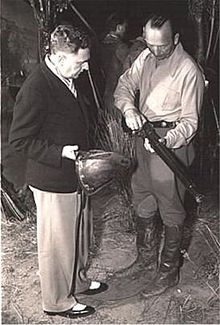Norman Reilly Raine
 From Wikipedia the free encyclopedia
From Wikipedia the free encyclopedia
This article needs additional citations for verification. (June 2015) |
Norman Reilly Raine | |
|---|---|
 Norman Reilly Raine (left) and Michael Curtiz (right) on the set of The Private Lives of Elizabeth and Essex (1939) | |
| Born | June 23, 1894 |
| Died | July 19, 1971 (aged 77) |
| Years active | 1933–1955 |
| Spouse(s) | Joyce Roberta Pett (divorced) Elizabeth Prudhomme (1958–1971, his death) |
Norman Reilly Raine (23 June 1894 – 19 July 1971) was an American screenwriter, creator of "Tugboat Annie" and winner of an Oscar for the screenplay of The Life of Emile Zola (1937).[1]
Early years[edit]
Raine was born in Wilkes-Barre, Pennsylvania. He began writing in 1912, when he was 17, with a job as a reporter on The Buffalo Morning Express. He stayed two years and left for service with the Canadian Expeditionary Force during World War I. He was discharged as a captain in the Royal Air Force. After the war he joined MacLean's Magazine in Toronto and became assistant editor. In 1924, in one of his articles, he commented at about rum-running, saying "It is openly asserted by the rum runners that Canadian banks finance or help to carry, by credit and other methods, some of the larger deals put over by the trade" which The Montreal Gazette called an "outstanding statement".[2] He died in Woodland Hills, California.
Broadway[edit]
Raine tried the Broadway stage in 1933. With Frank Butler as collaborator, he wrote Hangman's Whip, a jungle melodrama in which two well-known Hollywood actors, Montagu Love and Barton MacLane, played leading roles. It later became the 1933 film White Woman with Carole Lombard and Charles Laughton.
Hollywood[edit]
Raine wrote a series of Tugboat Annie stories for The Saturday Evening Post. In a 1940 news article, it was said he based Tugboat Annie on a female tugboat owner he knew and wanted to write a story about her; however the woman was gentle and Tugboat Annie was not. He also based Tugboat Annie on Marie Dressler after he watched Anna Christie.[3] In 1933 he wrote the screenplay for the film, in which Marie Dressler played Annie and Wallace Beery portrayed Terry, her hard-drinking husband, with whom she traded choice insults.
A 1934 news article said Raine always worked wearing a knit cap and, when he once misplaced it, wore his wife's as a substitute.[4] In 1950, he had been collaborating with writer Guy Gilpatric before he killed himself and his wife after she was diagnosed with breast cancer.[5] In a 1957 article, Raine mentioned that he once wrote a story about the Battle of the Little Bighorn but was rejected by a Hollywood magnate seven times to which Raine said "I'm ready to quit, it's the best I can do. What is there about it that displeases you?" and the magnate responded "I'll tell you, I hate Indians!".[6] He also once wrote for television, three episodes in the series Schlitz Playhouse of Stars.[7]
Subsequently, Raine wrote many other screenplays, among them The Perfect Specimen, God's Country and the Woman,[8] The Adventures of Robin Hood,[9] Each Dawn I Die,[10] The Private Lives of Elizabeth and Essex,[11] Mountain Justice,[12] The Fighting 69th,[13] Men Are Such Fools,[14] Eagle Squadron,[15] Ladies Courageous, We've Never Been Licked, Nob Hill, A Bell for Adano, Captain Kidd and Captains of the Clouds.[16]
References[edit]
- ^ "The 10th Academy Awards Memorable Moments". oscars.org. 2014-08-27. Retrieved June 6, 2015.
- ^ "The Booze Belt". The Montreal Gazette. December 18, 1924. Retrieved June 6, 2015.
- ^ "Washington Gossip". Daytona Beach Morning Journal. March 22, 1940. Retrieved June 6, 2015.
- ^ "New York Day By Day". The Miami News. April 5, 1934. Retrieved June 6, 2015.
- ^ "Writer Kills Cancer-Ridden Wife and Self". Pittsburgh Post-Gazette. Associated Press. July 8, 1950. Retrieved June 6, 2015.
- ^ "Try and Stop Me - Bennett Cerf". Reading Eagle. October 1, 1957. Retrieved June 6, 2015.
- ^ "Television". Lewiston Evening Journal. March 21, 1958. Retrieved June 6, 2015.
- ^ "Theater Gossip". The Evening Independent. September 1, 1936. Retrieved June 6, 2015.
- ^ "Robin Hood Film Here - Errol Flynn Plays Legendary Hero in Palace Picture". The Montreal Gazette. June 3, 1938. Retrieved June 6, 2015.
- ^ "George Raft and James Cagney, Co-Star in 'Each Dawn I Die'". The Milwaukee Sentinel. July 28, 1939. Retrieved June 6, 2015.
- ^ "The Private Lives Of Elizabeth and Essex Sunday at Gorge". Mt. Adams Sun. May 24, 1940. Retrieved June 6, 2015.
- ^ "Theater Gossip". The Evening Independent. April 15, 1937. Retrieved June 6, 2015.
- ^ "The Fighting 69th". Spartanburg Herald-Journal. February 11, 1940. Retrieved June 6, 2015.
- ^ "State Schedules 'Men Are Such Fools'". Spartanburg Herald-Journal. September 4, 1938. Retrieved June 6, 2015.
- ^ "Strand Films". Lewiston Evening Journal. October 31, 1942. Retrieved June 6, 2015.
- ^ "Theater Gossip". The Evening Independent. July 9, 1941. Retrieved June 6, 2015.
- William Freeman "Norman Reilly Raine, 76 (sic), Dead; Was Creator of Tugboat Annie", New York Times, July 29, 1971.